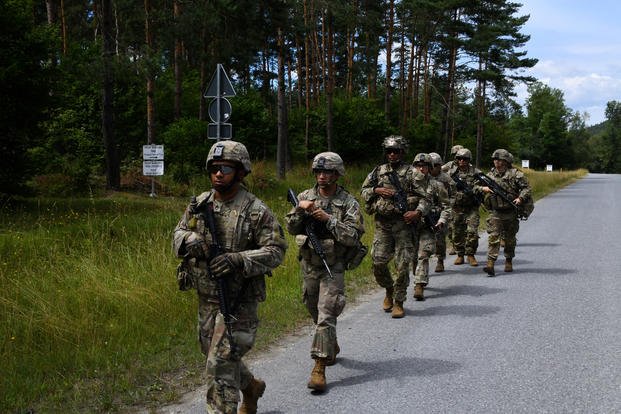The former commander of U.S. Army Europe (USAREUR) on Tuesday publicly criticized the Pentagon's decision to move 1,200 troops out of Europe, calling it a political move that will fizzle out over time.
Retired Lt. Gen. Ben Hodges, during a discussion on the state of the Army hosted by Defense One, called the withdrawal plan a "political decision not based on any strategic analysis" that will likely change drastically over the next several months.
Read Next: Troops, DoD Civilians Won't Be Able to Opt Out of Payroll Tax Deferral Plan
Defense Secretary Mark Esper made the controversial troop withdrawal announcement July 29 as part of a plan to strengthen Europe's eastern flank against Russia.
"I will bet you a glass of sweet tea ... that what happens looks nothing like what was briefed on the 29th of July," said Hodges, who is now Pershing chair in Strategic Studies at the Center for European Policy Analysis.
Hodges did not mention President Donald Trump, but said the move is about penalizing Germany because it has not contributed 2% of its gross domestic product to its own national defense. Trump has repeatedly called on NATO countries to increase their defense contributions, and has called Germany "delinquent" because it has not done so quickly enough.
"It's about punishing Germany because they are not [paying] 2%, but yet Italy and Belgium are the two countries that are going to gain the most," Hodges said, adding that Belgium pays less than 1% and Italy pays only 1.2%.
"The bottom line is what we are losing if these things happen ... is [the] confidence of our allies that we would make such a big decision that affects NATO and affects relationships -- that we would make a decision without any sort of consultation."
The move will likely take months to plan and years to complete, Army Chief of Staff Gen. James McConville said in a separate speech Tuesday.
"What we are doing is re-posturing our force, so we are in a better position to support our strategic objectives," McConville said.
Tom Karako, director of the Missile Defense Project for the Center for Strategic and International Studies, disagreed with Hodges' assessment of the withdrawal.
Redistributing forces is one way to make forces more difficult targets for adversaries such as Russia, Karako said, calling the forces in Germany a "big, fat juicy target."
"There is a strategic argument for doing things differently to adapt to a new environment," he said. "Of course, the devil is in the details. We have to wait and see, but I think we ought to be open to some different force structure in Europe."
Hodges argued that U.S. combat capabilities in Europe are already ill-equipped to deal with a serious threat from Russia.
"There is one Patriot [missile] battalion in all of Europe," he said, adding that it will take at least a Patriot battalion to protect Ramstein Air Base alone.
Instead of asking European countries to pay more for defense, the U.S. should be asking them to use their capabilities to protect specific zones against attacks, he said.
"This is where our allies could really pick up a much larger share," Hodges said. "Instead of always saying 2%, 2%, 2%, say, 'Hey, Germany, we need you and the Dutch -- you already have Patriots -- we need you to protect ... the Baltic region. Poland, you've got to cover Poland. Romania, you've to cover this area.'"
-- Matthew Cox can be reached at matthew.cox@military.com.
Related: Nearly 12,000 US Troops Will Pull Out of Germany at Cost of Billions, SecDef Says
Don't Miss a Single Military.com Story
To read the full article and get exclusive benefits, sign up today.
It’s FREE
Why am I seeing this? Visit our FAQs













